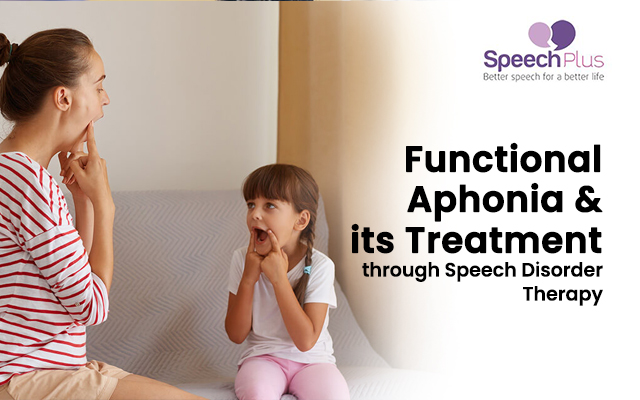Functional aphonia is a rare disorder where the patient cannot make himself heard because his voice might sound strange and hoarse, or at times, he can’t even speak at all. Functional aphonia can affect anyone, irrespective of age. However, it is often seen in people who are under too much stress and anxiety.
Like any other speech disorder, functional aphonia can also be treated by speech disorder therapy.
Causes of functional aphonia?
Functional aphonia is a disorder where the patients experience a sudden loss of voice or can’t speak above a whisper. It might be caused without any warning signs. According to researchers, about 4% to 9% of people suffer from functional aphonia. However, speech language pathologists think that cases of functional aphonia may even be higher as some of the patients do not seek treatment until they lose their voice completely.
The most common cause of functional aphonia is overuse of your voice in response to mental stress.Using your voice also depends upon the respiratory system, larynx, throat, nose and mouth. You may develop functional aphonia if you experience any one of the following:
- Excessive stress and anxiety
- Diseases in the respiratory tract like laryngitis, tonsillitis, allergies, and nodules.
- Straining your voice too much
- Consumption of alcohol, tobacco, pepper and vinegar beyond average quantity.
Some professionals are at a greater risk of developing voice disorders like, teachers, people working in factories dealing with machinery, telecallers and commentators. These individuals have to constantly use their voices to be heard which impacts their vocal cords. If you are one of them and experiencing discomfort in your voice, it is advised to undergo speech disorder therapy in Kolkata.
Speech disorder therapy for functional aphonia
Functional aphonia can be treated by speech disorder therapy. The treatment is carried out by experienced speech language pathologists who prepare a treatment plan for the patients after examining their vocal cord and analyzing their voice by dedicated computerized program.
The treatment plan focuses on voice and behavior therapy techniques to successfully cure patients with functional aphonia.
Your speech language pathologists may suggest the patients to do the following
- Voice rest
- Vocal exercises reduce the laryngeal muscle tension
- Medications to relieve pain and swelling of the vocal cords
- Staying hydrated
- No alcohol and tobacco consumption
Functional aphonia is a curable disorder only if it is diagnosed in its early stages. If ignored and left untreated for a long time, functional aphonia can lead to severe loss of voice. So, before things get worse, it is advised to consult with your speech language pathologist without delay.

